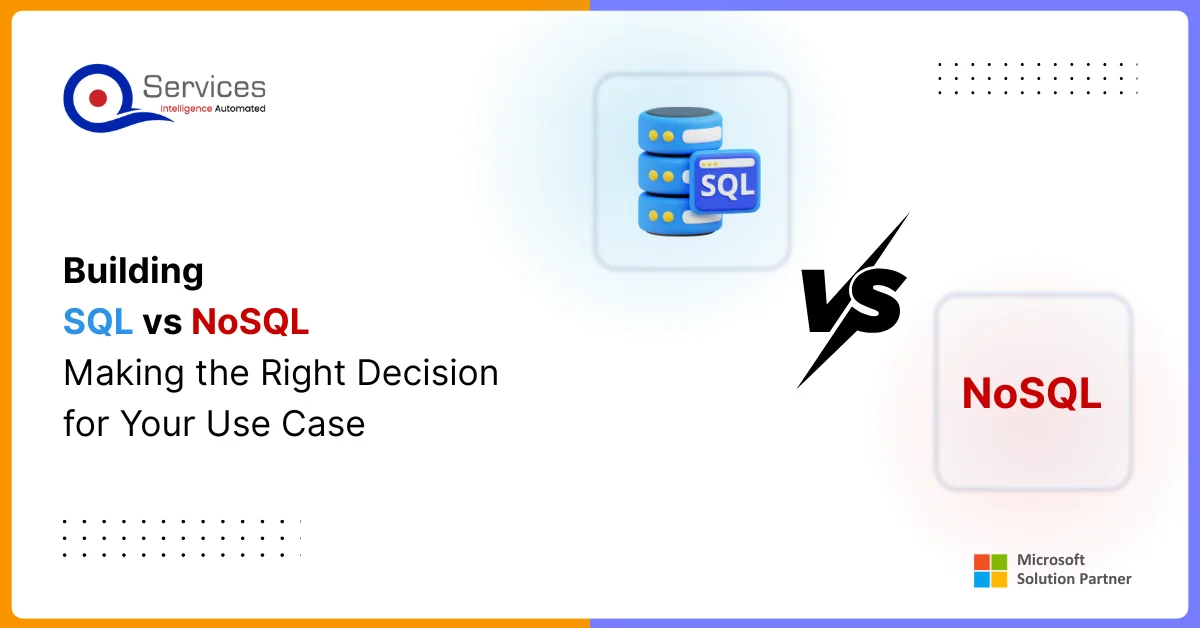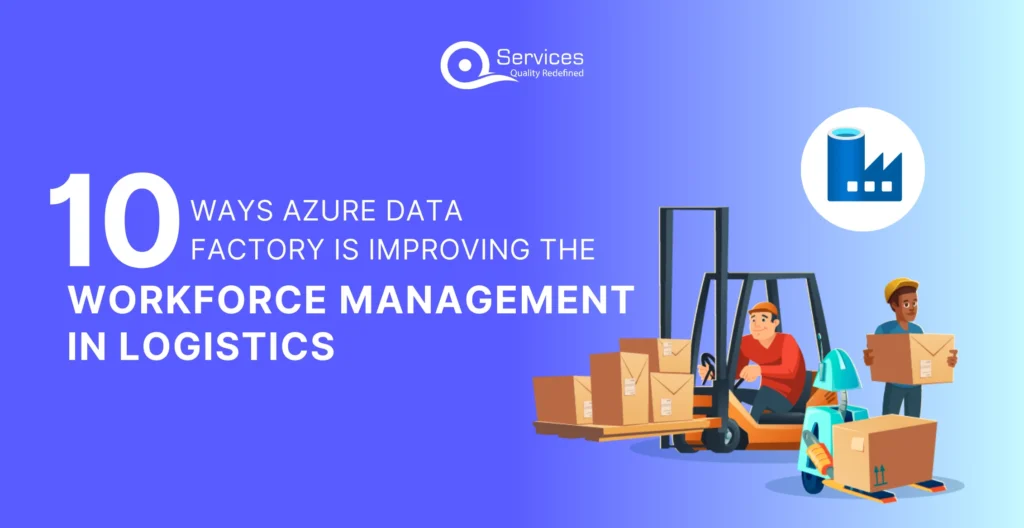
Home » 10 ways Azure Data Factory is improving the workforce management in Logistics

The transportation and storage of commodities from suppliers to customers is managed by the logistics sector. Effective workforce management is essential to this process, which ensures enough skilled workers are available to manage various tasks efficiently.
In this blog post, we’ll explore workforce management with Azure Data Factory effective solutions. The adoption of cloud technology has made workforce management more accessible and user-friendly, allowing operations to be conveniently managed via mobile devices.
Workforce management in logistics entails the strategic planning, allocation, and coordination of human resources to enhance supply chain efficiency. It addresses the complexities of managing distributed labor and fleet operations unique to the logistics industry. This involves recruiting, deploying, and managing workers across distribution centers, warehouses, and transportation networks.
The goal of effective logistics workforce management is to optimize operations by ensuring the right people with the appropriate skills are in place at the right time. It goes beyond basic processes, aiming for higher customer and employee satisfaction. This is achieved through efficient staffing, scheduling, training, and performance monitoring while meeting operational and service goals.
Get free Consultation and let us know your project idea to turn into an amazing digital product.
Efficient workforce management is highly significant in the logistics sector for several reasons. Without it, logistics companies often face various challenges that can impact their operations, customer satisfaction, and profitability.
Without meticulous workforce management, logistics operations risk becoming disjointed and inefficient which causes delays, inaccuracies, and escalate operational costs.
Inadequate planning and scheduling often lead to workforce imbalances, resulting in either an underutilized or overburdened workforce. Such discrepancies can hamper productivity and dampen employee morale.
Overlooking the management of work hours, breaks, and rest intervals can lead to inadvertent breaches of labor regulations. Such oversights expose companies to legal repercussions and financial penalties.
A lack of structured training, erratic scheduling, and limited growth opportunities can exacerbate turnover rates, amplifying recruitment and training expenditures.
Inefficiencies in workforce management can translate to service delays, inaccuracies, and diminished service quality. Such lapses can erode customer trust and tarnish a company’s reputation.
Insufficient training and oversight can compromise workplace safety, increasing the risk of accidents and injuries, thereby jeopardizing both employee well-being and operational continuity.
Without a robust workforce management framework, adapting to market shifts, seasonal demands, or unforeseen disruptions becomes a formidable challenge, potentially leading to missed opportunities and diminished market competitiveness.
The absence of comprehensive tracking and monitoring mechanisms restricts visibility into workforce activities. This lack of oversight makes it challenging to pinpoint inefficiencies and strategize improvements effectively.
Efficient workforce management is crucial for the logistics sector, offering several key benefits. It streamlines operations for maximum efficiency and productivity, leading to cost savings through optimized resource allocation. This approach also ensures compliance and reduces legal risks.
Moreover, it boosts satisfaction and retention by offering fair scheduling and career growth opportunities. For customers, it means better service quality, timely deliveries, and improved communication, enhancing satisfaction and loyalty. Lastly, it enables companies to adapt to market changes, scale operations, and seize new opportunities for long-term success.
Azure Data Factory is a robust cloud service offered by Microsoft, tailored for handling complex data integration projects such as hybrid ETL, ELT, and general data integration tasks. Here are its standout features and practical applications:
Data Compression: Azure Data Factory can compress data during the copying process, optimizing storage space and improving data transfer efficiency.
Versatile Connectivity: The platform boasts extensive connectivity options, supporting a diverse array of data sources to meet various integration needs.
Automated Triggers: Users can set up custom event triggers to automate data processing tasks, streamlining workflows and enhancing efficiency.
Data Validation Tools: Azure Data Factory provides tools for previewing and validating data before copying, ensuring data accuracy and reliability.
Flexible Data Flows: The service allows for the creation of tailored data flows, enabling users to customize data processing pipelines to suit specific requirements.
Comprehensive Security: Azure Data Factory integrates robust security features like Azure Active Directory and role-based access control, ensuring data protection and compliance with security protocols.


Azure Data Factory simplifies hybrid data integration for enterprises with its robust ETL capabilities in Azure. Seamlessly integrating data from diverse sources using over 90 built-in connectors, ADF offers a fully managed, serverless platform for both ETL and ELT processes. Whether you’re coding or using a code-free environment, Azure Logic Apps further enhance this integration with task automation, complemented by Azure Functions for event-triggered code execution. For logistics companies, this means gaining a holistic view of workforce data, from real-time tracking to inventory management. This comprehensive insight enables logistics firms to optimize planning, streamline operations, and make data-driven decisions, enhancing efficiency and customer satisfaction.
Azure Data analytics, enhanced by Azure Machine Learning, transforms logistics workforce management by continuously monitoring workforce activities like task completion and efficiency metrics. This immediate visibility enables managers to promptly address bottlenecks or inefficiencies, optimizing performance in real-time. Additionally, predictive Azure analytics forecasts potential issues based on historical data, facilitating proactive measures such as task redistribution or timely maintenance scheduling. Essentially, Azure Data Factory transforms logistics workforce management from reactive to proactive, empowering managers to enhance efficiency, streamline operations, and drive business success through informed decision-making.
Azure Data Factory (ADF) and Azure Logic Apps collaborate to transform logistics workforce management. ADF automates data flow and processing, from ingestion to analysis, eliminating manual handling and allowing staff to focus on strategic tasks. Azure Logic Apps orchestrates tasks and workflows across various systems, automating processes like task assignment based on skills and availability, and generating real-time reports. This automation reduces manual effort, minimizes errors in data entry and task allocation, and streamlines operations. Together, ADF and Azure Logic Apps empower logistics managers with efficient resource allocation, data-driven decision-making, and optimized workforce management.
As logistics operations expand, Azure Data Factory (ADF) effortlessly adapts by scaling to manage increasing data volumes, supported by Azure’s scalable infrastructure. This adaptability is vital for workforce management in logistics, ensuring efficient data handling as the team grows and meeting evolving data processing demands. ADF’s scalability, reinforced by Azure’s robust solutions, is instrumental in efficiently managing workforce growth and addressing dynamic data needs in logistics operations.
Azure Data Factory (ADF) ensures reliable data transfer and transformation, leading to accurate analytics and insightful projections for workforce planning. This reliability is reinforced by Azure’s robust infrastructure, enhancing workforce management in logistics. ADF maintains data integrity throughout transfer and transformation, facilitating precise analytics crucial for workforce forecasting. This, in turn, improves workforce planning and performance assessment in logistics operations. In essence, ADF’s dependable performance, backed by Azure’s solid foundation, plays a pivotal role in ensuring effective and data-driven management of the logistics workforce.
Azure Data Factory (ADF) offers robust security features, enhanced by Azure’s compliance capabilities, to protect sensitive workforce data. This ensures adherence to data protection regulations and cultivates trust among employees regarding data privacy and integrity. It creates a secure environment for managing confidential workforce data, meeting compliance requirements, and bolstering worker confidence in data handling. Thus, ADF’s security features, supported by Azure’s compliance framework, are essential components for ensuring trustworthy and compliant workforce management in logistics.
ADF’s pay-as-you-go pricing model and Azure’s cost-effective services enable logistics companies to efficiently manage workforce data. This cost-efficiency allows for optimized resource allocation, maximizing ROI. With flexible pricing, companies can scale their solutions as needed, adapting to changing business requirements. This approach to cost management and scalability enhances workforce planning and operational efficiency in logistics.
Azure Data Factory’s (ADF) code-free user interface and intuitive authoring, combined with Power BI’s analytics capabilities, simplify data management and analysis. This user-friendly approach to data handling is invaluable. It allows even non-technical members of the workforce to interact with, understand, and derive insights from data. This accessibility promotes informed decision-making and effective planning. By making complex data more approachable, ADF and Power BI empower the workforce to utilize data in their daily operations, leading to increased efficiency and productivity in logistics management.
The integration of Microsoft Teams promotes smooth collaboration and communication among logistics teams. This seamless interaction enhances coordination, leading to efficient workforce management. Dynamics 365’s intelligent business applications offer predictive, AI-driven insights that aid in running the business more effectively. These insights can help predict workforce needs, optimize resource allocation, and improve operational efficiency. By utilizing AI-driven insights, logistics teams can make data-driven decisions, enhancing productivity and effectiveness.
Azure Data Factory (ADF) and Power BI deliver timely and accurate data for managing the logistics workforce effectively. This data-driven approach lets managers make decisions based on real-time insights. It improves workforce planning by showing available staff and their capacity, helping with scheduling. Plus, it highlights areas for improvement to boost productivity. Overall, using ADF and Power BI for accurate data significantly improves how logistics companies manage their workforce, making operations more efficient.
The integration of Azure Data Factory provides these organizations with complete visibility of their workforce, enabling data-driven decision-making and improved efficiency. It’s not just a technological tool, but a strategic accelerator that helps these businesses improve their workforce management and address complex issues in the logistics industry. This proactive approach streamlines their current operations and paves the way for future growth and success in a competitive market.

Our Articles are a precise collection of research and work done throughout our projects as well as our expert Foresight for the upcoming Changes in the IT Industry. We are a premier software and mobile application development firm, catering specifically to small and medium-sized businesses (SMBs). As a Microsoft Certified company, we offer a suite of services encompassing Software and Mobile Application Development, Microsoft Azure, Dynamics 365 CRM, and Microsoft PowerAutomate. Our team, comprising 90 skilled professionals, is dedicated to driving digital and app innovation, ensuring our clients receive top-tier, tailor-made solutions that align with their unique business needs.

Most enterprises did not choose to be here. Core systems were built to be stable, not adaptable. Over time, layers of customization, integrations, and workarounds turned reliability into rigidity. Today, every new digital initiative feels harder than it should be.

A common industry saying goes, “The cloud does not remove complexity, it moves it.” With Azure IaaS, teams gain the ability to deploy Azure virtual machines, configure networks, and manage storage in a way that closely mirrors on-premise environments. This makes Microsoft Azure IaaS especially attractive for legacy applications, regulated workloads, and hybrid cloud strategies.

In 2026, it’s vital for every developer to be skilled in using the right set of Azure developer tools for cloud projects. Microsoft’s Azure cloud platform is at the center of this shift, providing a wide range of solutions for building and managing apps. With cloud development with Azure, teams can launch reliable apps that scale globally and respond to business needs in real time. Picking the right items from the Azure tools list can save time, money, and help you get better results.
Azure Data Factory benefits the logistics sector by simplifying data integration, providing real-time analytics, automating workflows, ensuring reliable data processing, and enhancing security. It enables logistics companies to optimize workforce management, streamline operations, improve decision-making, and adapt to market changes effectively.
Azure Data Factory automates workflows in logistics by allowing users to create and schedule data-driven tasks and processes. With its built-in capabilities and integration with Azure Logic Apps, it enables seamless automation of data ingestion, transformation, and analysis. This automation reduces manual effort, minimizes errors, and streamlines operations, enabling logistics companies to focus on strategic tasks and improve efficiency.
Yes, Azure Data Factory is suitable for both small and large logistics companies. Its scalable infrastructure allows it to adapt to the needs of growing operations, making it a flexible solution that can support businesses of varying sizes. Whether a company is just starting out or has an established presence in the logistics industry, Azure Data Factory provides tools and capabilities that can enhance workforce management.
Azure Data Factory helps logistics companies adapt to market shifts by providing real-time analytics and insights. By continuously monitoring data, Azure Data Factory enables companies to quickly identify changing market trends or demands. This timely information allows logistics firms to adjust their workforce planning, resource allocation, and operational strategies promptly, ensuring they remain agile and competitive in dynamic market conditions.
Azure Data and Analytics Services ensures data accuracy and reliability through built-in data validation tools, real-time monitoring, and automated error detection mechanisms. These services also offer comprehensive data quality features that allow users to preview, cleanse, and transform data to maintain its integrity throughout the processing pipeline.
Azure Data Factory provides robust support through Microsoft’s Azure Support services. This includes access to documentation, tutorials, and community forums for self-help and troubleshooting. Additionally, Azure offers various support plans with different levels of technical assistance to address specific needs and ensure the smooth operation of the Azure Data Factory.
Yes, Azure Data Factory is designed to handle increasing data volumes as logistics operations grow. It leverages Azure’s scalable infrastructure, allowing companies to seamlessly manage and process large amounts of data without compromising performance. This scalability ensures that logistics firms can adapt to evolving data needs and expanding operations, ensuring efficient data handling and processing at any scale.

Founder and CEO

Chief Sales Officer
